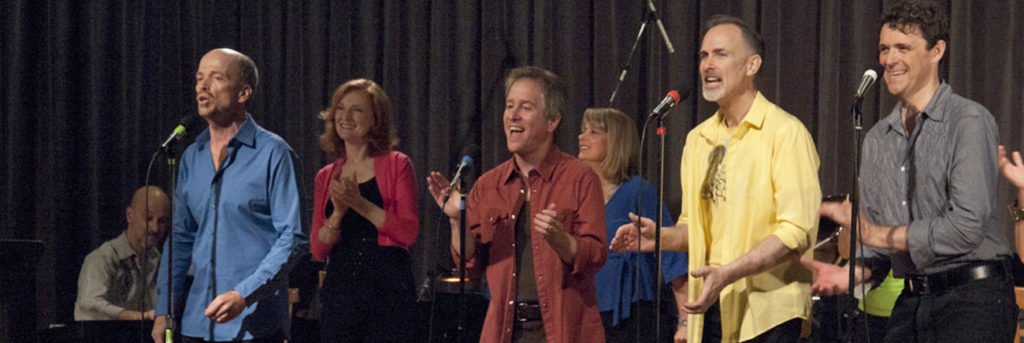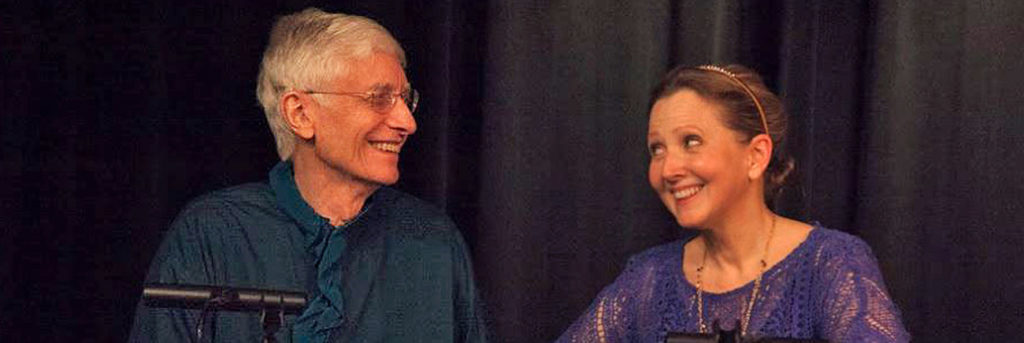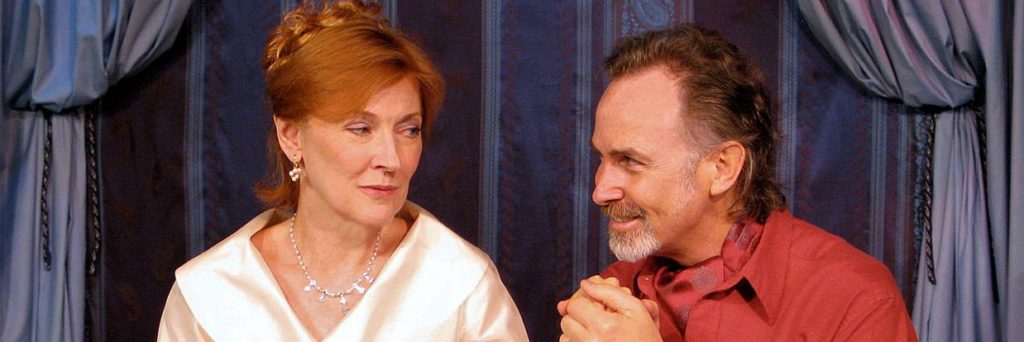Mary Garden; or, Can a Woman Love
and Still Be Free?
By Carrie Wilson
Many women, while wanting to have love in our lives, have been afraid, felt that in loving a man we would lose our individuality and freedom. In Aesthetic Realism and Love, Eli Siegel described the true nature of love and why it is, in fact, in behalf of freedom:
Love is having your way by being able truly to give yourself to another. Love is the feeling that by being affected deeply by another, beginning by seeing that other, you are going to be more yourself.
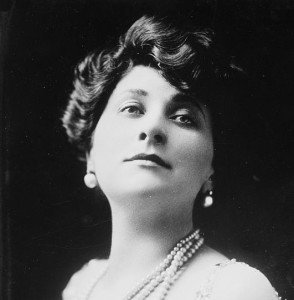
I’m grateful to tell here what I learned, and now teach as an Aesthetic Realism consultant to women, and about the important opera singer whose autobiography, Mary Garden’s Story, Mr. Siegel recommended, because, he said, her life brings up “the matter of what to leave out and what to include. Mary Garden said she didn’t want to marry. She felt that something interesting her might take her away from something else.” This is a question had by many women, and Aesthetic Realism answers it magnificently.
I learned that when we care for anything—an art, a person, a country—that care can be, and has to be, a beginning point for caring for everything else in reality. When it is, our love for music, or for Roberto, is a means of achieving our deepest desire–to like the world. And so love is a means of becoming ourselves fully.
A woman, I learned, has to do what art does, she has to put opposites together. “All beauty,” Eli Siegel stated, “is a making one of opposites, and the making one of opposites is what we are going after in ourselves.” Beginning opposites in everyone’s life are self and world. And the great enemy to love, and to our freedom, is our desire to have contempt for the world.
Though I had studied art and literature, was pursuing an acting career and singing with a folk-rock trio, I agonized over why I didn’t seem to be able to care for anyone in the way I felt I should. At 23, I wrote in my journal:
I care for people in the most mild way imaginable. Against my will and inclination I am becoming old in spirit. I need a man to make my life worth anything to me–and no one will do–I am terrifically hard to please. [But then I wrote:] I need to be alone–truly alone to do my work and to feel my integrity and value clearly and strongly.
In 1969, when I began to attend classes with Mr. Siegel, he spoke to me about the fight between wanting to love and wanting to be elusive. He asked if I had played hide and seek with people, including men, and he said: “This double desire to be a part of a person’s life and assert one’s independence forever tears people apart.” Had I not had the great good fortune to meet and study Aesthetic Realism, this would have been a description of my whole life. I believe that double desire was the central cause of pain in the woman I speak of now.
I. She Was Trying to Put Together Independence and Dependence
Mary Garden, who lived from 1874 to 1967, and who introduced modern French opera to America, had a remarkable ability to give herself to a character. People felt she was the person she portrayed. The critic Merle Armitage writes of the audience’s wonder:
…that the woman who sang Thaïs one night was the same body and mind which assumed such ethereal qualities as Melisande a few nights later.
And in her autobiography Miss Garden herself says of the characters she played:
I had them all in me, in my very flesh and blood. If only someone could tell me about that. I must confess it has always been a mystery to me.
In an Aesthetic Realism lesson Mr. Siegel explained to an actress: “It is what you already are that enables you to take on somebody else….We are of everything.” To see and welcome this oneness of self and world is, I have learned, the same as wisdom for oneself.
In his lecture Mind and Intelligence, Mr. Siegel has these sentences I wish Miss Garden could have heard:
Music, the arts, are intelligence, because when the arts are authentic they always are free and they always are precise, accurate. There is a beautiful mingling of limitation and the infinite.
As a singer, Mary Garden was able to put precision and freedom together. In 1902, the composer Claude Debussy chose her to create the role of Melisande in his opera Pelleas et Melisande. Of her impersonation, Arthur Meeker writes:
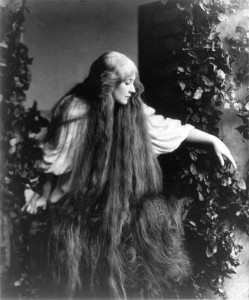
Truly, I am resigned to having lived in the first half of the turbulent twentieth century, if only because I have been able, a dozen times, to see Mary Garden in Pelleas et Melisande.
She loved the music of Debussy. As she took the role of Melisande, she felt, I believe, that oneness of limitation and the infinite she wanted. In a recording she made in 1902, with Debussy at the piano, which I think is beautiful, despite the surface noise of the old recording, her voice comes out clear and yet like a trembling sigh, seeking and restrained, wondering and controlled. Miss Garden rightly cherished this ability in herself.
Yet though she wanted, as she sang many roles, to give herself with fullness to the music, she also wanted, as women can, to divest herself of the world and people. She writes:
…when I finished any performance of mine…and went home and had my glass of milk…I never remembered that I had sung anything or…had been impersonating anyone. Never, never, never. I was always Mary Garden, myself, again.
In this statement we see one of the ways she wanted, as Mr. Siegel said to me, to “assert her independence forever.” And this woman, whose name, between 1910-1925 was “unquestionably a household word,” said she felt she never let anyone know her.
Born in Aberdeen, Scotland, her family moved to America when she was eight. In her autobiography, she says this:
Early in life I taught myself a very simple lesson–don’t lean on anyone but yourself. I have always been independent in my work and in my life. I could never belong to anyone. What it must be like to be chained to anyone!
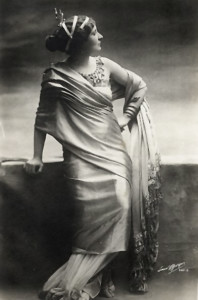
This is the same woman who proudly asserted, “I need the music, I depend on it.” How I wish she could have learned that she could be proud to need a person for the same reason she needed music. One can see that she was deeply troubled over why she never felt she really loved any of the men she had to do with. She writes:
I never lost my heart,…never knew what it was to have that mad passion….I can’t explain it.
Shortly before she left for Paris to study singing, Mary told a young man who wanted to marry her:
I know it’s got to be one or the other, music or marriage; it can’t be both. I’ve made up my mind. I’ve decided I want music.
She was afraid that love would hinder her care for music and singing. In Edward Wagenknecht’s book Seven Daughters of the Theatre, he quotes her as saying: “I’ve seen so many fine careers snarled and caged and laid low by desires; they are insidious things, and dangerous ….Watch them, seize them, bind them, strap them down with iron clamps.”
Mary Garden, like other women, had two fears, one sensible and one very unwise, and she wasn’t able to see the difference between them. She was afraid of the selfishness that so often goes with what is called love, the desire to possess and have power over another person that can be in both men and women. But she was also afraid to care too much for another person because she thought it would interfere with her care for herself and make her less free.
II. A Young Woman Learns About Love and Becomes More Free
Carolyn Porter, an attractive and lively young teacher of history, moved to New York from Ohio to study Aesthetic Realism. Though she had had to do with a number of men, she felt every time she was in a relation with a man she concentrated on him to the exclusion of other things and became less interested in the world. She greatly prized her independence–she had her apartment, she had her career, and when she came home she could do as she pleased. Meanwhile, Miss Porter was longing to care truly for a man. In one consultation we asked: “Is there any man you’re interested in now?”
Carolyn Porter: I’m very interested in Abraham Lincoln. Really, I don’t just feel there’s a man that I feel interested in, in just that way.
Consultants: When you say, “Just that way,” do you think it’s already making too much of a separation [between your interest in a man you may know and interest in a person in history]?
CP: Yes, it is.
Some weeks later, in a consultation, she mentioned that she and Ben Sawyer, a man who is studying Aesthetic Realism and is also a teacher, had been having conversations which she liked very much–they were interesting, exciting. But she indicated she wasn’t sure she wanted things to go any further. We asked Ms. Porter questions Mary Garden needed to hear: “Are you afraid of someone affecting you more deeply? Are you afraid to be engaged entirely with another person?” “Yes,” she said, “but I am affected by his kindness. I’m very grateful that he’s a friend.” As she said this, there was, we pointed out, “a touch of very polite agony” in her voice. I’ve learned that while we want love very much there’s something in every person that’s against it.
As their conversations continued, Carolyn Porter increasingly respected Mr. Sawyer, and even though she could be, as she admitted, intimidating, he wasn’t thrown, but gave her good natured criticism and continued to want to know her. We encouraged her to want to do what Aesthetic Realism shows is essential in caring for a person truly: to be interested in how he sees the world–his work, his family, his home town of Muncie, Indiana. She told us she cared very much for the way he talked about people, including children, getting the justice they deserve and the need for Aesthetic Realism to be known by America.
She wrote assignments, such as: “What I Can Learn from a Man,” “Notations about My Superiority,” “Examples of Dependence and Independence in the World and in Myself,” and she wrote about a man she cared for in relation to each of the 15 questions of Eli Siegel’s “Is Beauty the Making One of Opposites?” Ms. Porter told us:
I have never been so deeply moved by a man as I am by Ben Sawyer….I feel a more complete, wider, practical, kinder person through knowing him and I’m glad to need his criticism, his perceptions, his humor to know myself and the world better. Through him my thought about friends, students, and people as such is getting deeper. I love Ben Sawyer very much.
III. Contempt vs. the Ability to Care
The man who seems to have meant most to Mary Garden was J. Ogden Armour, who had inherited a multimillion dollar meatpacking business. He is described by Arthur Meeker as: “guileless and kindly…I should think he was a classic example of a rich man’s son who didn’t know what to do with himself.” Miss Garden tells of their meeting:
I don’t like calling it love at first sight, because I’m certain I never loved anyone in my life, and I am impatient with that sort of nonsense. But I found my heart pounding and I was tingling all over….He had never heard an opera in his life; he knew nothing about books; he had never traveled….There was something untouched about him that fascinated me, much more than his love for me, for I must confess that his love got to bore me terribly. He knew that he never in the world would capture me.”
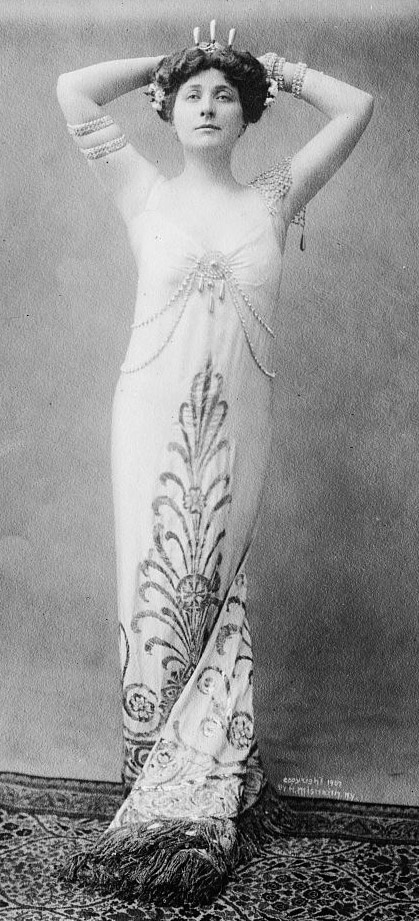
In an Aesthetic Realism class, Eli Siegel asked a young woman: “Do you know what the Mary Garden complex is?” “No,” she said. And Mr. Siegel said, “Mary Garden wanted men to like her singing but not her lips. She was quite furious with men, because they seemed to be interested in something else than her singing.” And I believe that, like many women, because Miss Garden was angry and had contempt for men, not granting them the same depth she gave herself, she could bring out a man’s desire to conquer her, and then be furious with him for the very thing she had elicited. Meeker describes a visit she made to Ogden Armour’s office:
Mary, perfumed and soignée (was) perched on the edge of his desk, displaying what in 1910 must have been a daring expanse of silk-stockinged leg, puffing at a cigarette, and blowing the smoke deliberately in her host’s face…. Out of this inauspicious encounter a durable, if stormy, friendship developed….
She invited him to the opera; he came and saw her as the courtesan Thais. Remembering what happened later, Miss Garden writes:
How wretched he became, because I suppose, he could never have me the way he wanted me, to possess and dominate me in every way!
But she invited him to visit at her hotel and her villa in France. In an Aesthetic Realism class, Mr. Siegel explained to me something Mary Garden needed ever so much to hear:
Eli Siegel: Ask, a year from now, do I want to respect this person I’m making a date with? Do I want this person’s life to be better?…The other thing is to make fools of people without them knowing it. Do you?
CW: Yes.
ES: I say you have to have good will.
This criticism changed my life. Eli Siegel saw the mind and self of woman with an entire respect that is new in this world, and I love him for it. I had despised myself for the way I had used and given pain to men. I learned the reason I felt so bad was because my purpose was bad, not because, as Mary Garden wrote, “the right man passed me by.” She needed to know she had to have the same purpose in knowing a man as she had in knowing a character in opera–to complete herself through being fair to the world.
In her commentary to an issue of The Right of Aesthetic Realism to Be Known, Chair of Education Ellen Reiss wrote:
All the human-caused grief in history and individual lives, has occurred because people every day equate freedom with contempt. This is what persons have deeply and hourly taken their freedom to be: “I don’t have to think about you or ask myself what is fair to you….I have no obligation to be accurate about a thing or person–for then I would be tied down, not free.”
Miss Garden didn’t want to think about what it would mean to be fair to Ogden Armor, and she describes how, when she found out he was, unknown to any of his friends, alcoholic, she never said anything to him about it. A woman can want a man to be weak so she can solidify her scorn and justify her coldness. Finally she refused to see him, and several years later she learned his drinking had killed him. At the end of her autobiography, she writes: “Whether loving me helped any of the men whose stories I have told I’m not at all sure.” This is what, through the study of Aesthetic Realism, women, including myself, never have to feel. I learned, as Mr. Siegel explained in a class, that “love is intense good will. We feel that in bringing out the best in another person, we flourish ourselves.”
I’m grateful that through my marriage to composer Edward Green, I have become more myself, freer, more intelligent. His criticism, logical and cheerful, has made me a better person. And we are so fortunate to be learning together in classes taught by Ellen Reiss.
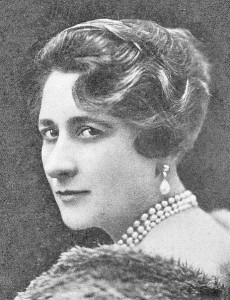
During World War II, Mary Garden was affected deeply when she joined her sister in nursing wounded soldiers at their family home in Scotland. Then, at the age of 74 she received an invitation to do a lecture tour in America, and it seems she was able to give herself to people in a new way. She wrote:
I had never let anyone know me, really. They had known Melisande and Salome and Louise and Thais about as well as anyone could ever know them, but in all those thirty years of singing and acting they had never seen and heard Mary Garden….Now it is I who get them into my heart, and it is I who give my heart to them….It is as if I had… suddenly thrown off my disguise and said: “Ladies and gentlemen, I give you myself.”
Mary Garden wanted to hear what Aesthetic Realism is enabling women to learn now, how to care honestly for the world and people as a means of liking ourselves; how to love in a way that is the same as freedom.
First presented at the Aesthetic Realism Foundation, New York City.

